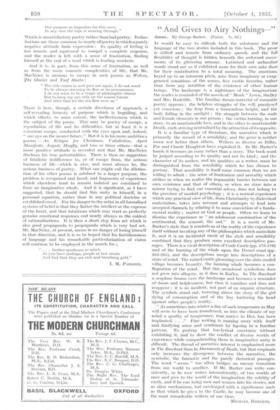" And Gives to Airy Nothings— Janus. By George Barker.
(Faber. is. 6d.) Jr would be easy to ridicule both the substance and the language of the two stories included in this book. The prose is stilted and remote front ordinary speech, and the -full flexibility of thought is hidden beneath the awkward move- ments of its glittering armour. Latinised and unfamiliar words stand out as if exhibited more for their own sake than for their contribution to a total meaning. The emotions, keyed up to an inhuman pitch, arise from imaginary or exag- gerated sensations of the senses, five exotic luxuries, rather than from any intuition of the existence of other human beings. The landscape is a nightmare of the imagination; the reader is reminded of the novels of " Monk " Lewis, Shelley and Mrs. Radcliffe. The familiar dream-material of romantic: poetry appears ; the helpless struggles of the will, paralysed yet conscious ; the leap from a tremendous height, and the body falling in the sunlight ; the struggle, between the male and female elements in one person ; the victim turning, in one story, to an unattainable love, and in the other to unattainable Death, each striving neutralised by the attraction of its opposite.
It is a familiar type of literature; the narrative which is primarily the record of a sensibility, and the genre is neither worse nor better than others. Writers as diverse as Rilke, Poe and Claude Houghton have exploited it. In Mr. Barker's hands it becomes an essay rather than a story. The book must be judged according to its quality and not its kind ; and the character of its author, and his qualities as a writer, must be distinguished from the sensibility which he has chosen to partray. That sensibility is itself more common than we are willing to admit : the sense of frustration and unreality which strikes us when we realise the impassable barrier between our own existence and that of others, or when we stare into a mirror trying to find our essential selves, does not belong to the province of morbid psychology ; it is a normal experience which any practical view of life, from Christianity to dialectical materialism, takes into account and attempts to lead into accepted channels by relating it to some conviction of a funda- mental reality ; matter or God or people. Often we learn to dismiss the experience as " an adolescent combination of the sentimental, the sensual, the sad." It is a merit of Mr. Barker's style that it reminds us of the reality of the experience itself without invoking any of the-philosophies which assimilate it and it is an incidental merit of the' style and. sensibility combined that they _produce. some excellent descriptive pas- sages. There is a vivid description of Corfe Castle (pp. 175-176) and of the burning of the whale upon the Dorset coast (pp. 284-285), and the descriptions merge into descriptions of a state of mind. The ruinedeaStle glowering over the slate-roofed village becomes Insanity, the burning whale becomes a con- flagration of the mind. But this occasional symbolism does not grow into allegory, as it does in Kafka: In The Bacchant a seaplane booms over the landscape and becomes a reminder of doom and helplessness; but then it vanishes and does not reappear ; it IS an incident, not part of an organic structure. The sym,bols, stand. out, towering above the story of.the girl dying of consumption and of the boy battering his head against other people's 'reality.
. " As sometimes into winter a day of such temperance as May will seem to have been transferred, so into the climate of my mind a quality of temperance, true, native to Her; has; been implanted: . ." Fine writing is running away 'with itself and. falsifying sense -and •Sentifnent • by lapsing to' a familiar pattern. To. portray that too-lyrical sweetness without exhibiting it, and' to show the ecinflict of diverse worlds of experience while comprehending them in imaginative unity is difficult. The thread of narrative interest is emphasised more in The B. acehant than In Doeumen fs of Death, but that emphasis only increases the divergence between the narrative, the symbolic; the fantastic and the purely rhetorical passages. The word " seems " too often bridges an uneasy transition from one world to another. If Mr. Barker can write con- sistently, as he now writes intermittently, of two worlds at once and give to the world of the imagination the solidity of earth, and if he can bring men and women into 'his stories, not as alien mechanisms, but surcharged with a significance such as that which he gisTs to the Castle, he may become one of the most remarkable writers of our' time.
MICHAEL ROBERTS.










































 Previous page
Previous page